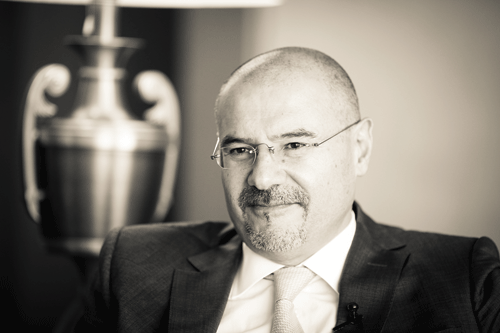Continuing with their investigations of banks involved with Iran, United States authorities went after Standard Chartered Bank (SCB) last month, accusing the British bank of helping Iranian banks and corporates hide around 60,000 transactions worth at least $250 billion between 2001 and 2010. To settle these accusations and avoid seeing its New York license revoked, SCB agreed to pay a $340 million penalty. Prior to this scandal, with Asia as its core market, SCB had recorded its 10th straight year of record profits, standing at $3.95 billion as of the end of June 2012, up 9 percent year-on-year. The bank also announced plans to add as many as 1,500 jobs in the second half of the year. To shed light on the bank’s performance in the Middle East and North Africa region, Executive sat with Christos Papadopoulos, SCB’s head of MENA and Pakistan.
E Standard Chartered has agreed to pay $340 million to settle the American accusations of working with Iran. Is this the price to pay to resolve a public relations headache and avoid seeing the New York license revoked?
We are continuing to have discussions with a number of other regulators in the US and it would be inappropriate for me to comment on when the discussions will be completed. We have an agreement to settle with the New York regulator.
E With respect to clients from the MENA region, have some of your clients stopped doing business with Standard Chartered? How has this issue affected your business?
Our clients in the MENA region have been very supportive and it is business as usual. We remain open for business. Given the sensitivity of the issue, I cannot comment further.
E Have we seen the worst in Europe yet?
I definitely think it is not over. I believe Greece will go out of [the euro] with a possibility that this will happen by the year’s end. When that happens, we will go through a significantly stressed situation, a bit like when Lehman Brothers went under. The hope is that by then the European Union would have the firepower to contain the contagion from Greece. I don’t expect more bailouts for Spain, Cyprus, etcetera, beyond what we have already had.
E How has the turmoil in the MENA region affected demand for banking services?
The turmoil has affected the appetite for credit, but we have seen counterbalance in the significant stimulus provided by the governments such as in Saudi Arabia and Qatar. As banking services are correlated to economic activity, we went through a phase of subdued activity and we are still in that phase as there is no clarity. In the medium term, I am very optimistic; some classes of assets appear to be gaining more momentum, like Islamic banking, and I expect [this momentum] to accelerate in the medium term in markets such as Egypt.
E Why Egypt?
We couldn’t do Islamic banking in Egypt before. Now with the Muslim Brotherhood in power, we expect a regulatory framework that allows for Islamic banking and we expect the population would want to buy [Islamic banking products]. We are increasingly developing solutions to offer the whole stream of products, both conventional and Islamic.
E Where do you see the highest opportunity for growth for the banking sector in the region?
Saudi Arabia, Egypt and Iraq are the markets of tomorrow as they are enjoying a lot of economic activity. But I also see a strong opportunity in Lebanon where we want to focus on non-resident clients. Lebanon has a massive diaspora in markets like Africa and the Gulf and this becomes a much bigger proposition.
E Which of the following will see the most significant growth in the coming years: retail banking, private banking or investment banking?
The retail banking business will reflect the demographics and in this region, as the youth come into employment, there will be an appetite for consumer products and therefore consumer banking — so we see a big opportunity in this space. We also see a big opportunity in private banking because there are big wallets in the Middle East. As for investment banking, the need will always be there but in the medium term, I expect consumer and private banking to gain more momentum.
E With increased scrutiny on Swiss private banks, do you sense that big wallets in the Middle East will increasingly look for bankers in the region as opposed to developed economies?
The coverage was always done both in the Organization for Economic Co-operation and Development (OECD) countries and in the [MENA] region with bankers flying in and out. The main issue is where the assets are booked: Switzerland vs. Singapore vs. Dubai. As the OECD region becomes hostile to some of the clients, they are looking for solutions in different locations. In my view, it is increasingly in Dubai and Singapore, which is why we are seeing many private banks moving and rebalancing their resources into the Middle East. Bankers are booking their clients’ assets in the Middle East. A private bank client books his assets where he feels comfortable.
E Once the dust settles, do you expect other banks to come back to the region?
It is a mixed picture. On one hand, European banks are pulling out from the region. They are reducing their assets not just in the Middle East and Asia but also in the US. On the other hand, American and Japanese banks are looking for growth opportunities. We have seen Japanese banks as big buyers of European banks’ Middle Eastern assets. It shows appetite [for assets in the region].










